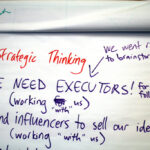Success is an elusive concept that many aspire to achieve, but mastering it requires more than luck. One key element lies in the continuous development of skills. This article will guide you through effective skill building strategies to build and enhance your skills, paving the way for substantial personal and professional growth.

Table of Contents
I. Introduction
A. Definition of success
Success is the accomplishment of an aim or purpose. It’s the realization of one’s goals, whether they be personal or professional, and the positive outcome of one’s efforts and endeavors. Success is subjective, as it varies from person to person, reflecting individual aspirations, achievements, and fulfillment. It goes beyond mere wealth or recognition, encompassing a sense of personal satisfaction and the achievement of one’s desired level of prosperity and well-being.
B. Importance of skill building
Skill building is like adding tools to your toolbox—it equips you to tackle a variety of tasks effectively. Whether it’s learning a new language, mastering coding, or improving your communication skills, each skill acquired is a stepping stone to personal and professional growth.
In today’s dynamic world, where change is constant, being adaptable is key. Skill building fosters adaptability by enhancing your ability to learn and apply new concepts. It’s like having a superpower that lets you navigate different challenges with confidence.
Moreover, honing your skills not only boosts your self-esteem but also opens doors to various opportunities. Employers value individuals with diverse skill sets, making you a more attractive candidate in the competitive job market. It’s like building a resume that tells a story of continuous improvement and versatility.
On a personal level, skill building adds richness to life. It allows you to explore your interests, discover hidden talents, and engage in meaningful activities. It’s not just about acquiring skills for the sake of it; it’s about enriching your life and finding fulfillment in the journey of self-improvement.
So, whether you’re learning to code, improving your writing, or developing leadership skills, remember that each skill you acquire is an investment in your future success and personal satisfaction. It’s a journey of empowerment, growth, and becoming the best version of yourself.
C. Overview of effective strategies for skill building
This article explores practical and proven strategies to help you master success through skill building. From self-assessment to embracing a growth mindset, each step contributes to your overall development.
II. Identifying Core Skills
A. Self-assessment
Understanding your strengths and weaknesses is crucial. Conduct a thorough self-assessment to identify the skills you excel at and areas that need improvement.
B. Industry-specific skills
Different industries demand different skill sets. Identify the core skills relevant to your field and focus on honing them to stay competitive.
C. Transferable skills
Don’t overlook transferable skills—abilities that are valuable across various roles and industries. Cultivate these skills to broaden your professional horizons.
III. Setting Clear Goals
A. SMART goals
Set Specific, Measurable, Achievable, Relevant, and Time-bound goals. Clear objectives provide direction and motivation for skill building efforts.
B. Long-term vs. short-term goals
Balance long-term aspirations with short-term objectives. Breaking down larger goals into manageable tasks ensures consistent progress.
C. Aligning goals with desired skills (skill building)
Ensure your goals align with the skills you aim to develop. This synergy enhances the relevance and impact of your skill building journey.
IV. Creating a Structured Learning Plan
A. Researching resources
Explore a variety of learning resources—books, online courses, workshops, and mentors. Create a personalized learning plan based on your goals.
B. Building a curriculum
Construct a curriculum that covers both foundational and advanced skills. A well-rounded education enhances your versatility and adaptability.
C. Allocating time effectively
Prioritize skill building in your schedule. Dedicate specific time slots for learning to ensure consistent and sustainable progress.
V. Embracing Continuous Learning
A. Staying updated with industry trends
Industries evolve, and staying abreast of the latest trends is vital. Continuous learning ensures you remain relevant and valuable in your field.
B. Networking for knowledge exchange
Connect with professionals in your industry. Networking provides insights, opportunities, and a platform for sharing knowledge.
C. Participating in workshops and courses
Engage in workshops and courses to gain hands-on experience. Practical learning accelerates skill development and reinforces theoretical knowledge.
VI. Overcoming Challenges
A. Dealing with setbacks
Setbacks are inevitable. Develop resilience and learn from failures. They are stepping stones on the path to mastery.
B. Adapting to changes
Industries evolve, and so should you. Embrace change, adapt quickly, and view challenges as opportunities for growth.
C. Seeking mentorship and guidance
Connect with mentors who have walked the path to success. Their guidance provides invaluable insights and shortcuts to mastering your craft.
VII. Utilizing Technology for Skill Enhancement
A. Online courses and platforms
Take advantage of online courses and platforms that offer flexibility and accessibility. These resources cater to various learning styles and preferences.
B. Skill-specific apps and tools
Explore apps and tools designed to enhance specific skills. Whether it’s language proficiency or coding, technology can be a powerful ally in skill development.
C. Virtual reality and simulations
Immersive experiences through virtual reality and simulations provide a hands-on approach to learning. These technologies bridge the gap between theory and practice.
VIII. Balancing Soft and Hard Skills
A. Importance of interpersonal skills
Soft skills, such as communication and teamwork, are as crucial as technical skills. Balance both for a well-rounded skill set.
B. Nurturing emotional intelligence
Emotional intelligence enhances your ability to navigate relationships and manage stress. Cultivate this skill for personal and professional success.
C. Integrating technical skills
While soft skills are vital, don’t neglect technical proficiency. A combination of both sets you apart in a competitive landscape.
IX. Building a Personal Brand
A. Showcasing skills through projects
Create tangible evidence of your skills through projects. A portfolio showcases your capabilities to potential employers and collaborators.
B. Creating an online portfolio
In the digital age, having an online presence is crucial. Develop a professional website or LinkedIn profile to highlight your achievements and skills building.
C. Networking on professional platforms
Join professional platforms to expand your network. Engaging with like-minded individuals opens doors to opportunities and collaborations.
X. Measuring Progress
A. Tracking achievements
Regularly assess your accomplishments against set goals. Celebrate achievements and use setbacks as learning opportunities.
B. Reevaluating goals
As you progress, re-evaluate your goals. Adjust them based on newfound insights and changing aspirations.
C. Celebrating milestones
Acknowledge and celebrate milestones along the way. Recognizing your progress boosts motivation and sustains momentum.
XI. Staying Adaptable in a Dynamic Environment
A. Embracing change
The only constant in life is change. Embrace it, adapt swiftly, and view every change as an opportunity for growth.
B. Remaining open to new opportunities
Success often comes in unexpected forms. Stay open to new opportunities, even if they deviate from your initial plan.
C. Continuous improvement mindset
Adopt a continuous improvement mindset. Strive to enhance your skills and knowledge throughout your career.
XII. Case Studies of Successful Individuals
A. Real-life examples
Explore case studies of individuals who mastered success through skill building. Their stories provide inspiration and practical insights.
B. Learning from others’ journeys
Extract key takeaways from others’ journeys. Understanding the paths they took can guide you in your own skill-building endeavors.
C. Extracting key takeaways
Identify commonalities and lessons from diverse success stories. These takeaways serve as valuable principles for your personal growth.
XIII. Encouraging a Growth Mindset
A. Embracing challenges
A growth mindset sees challenges as opportunities for learning and improvement. Embrace challenges with a positive outlook.
B. Learning from failures
Failures are not setbacks but stepping stones to success. Analyze and learn from failures, using them to refine your approach.
C. Cultivating a positive outlook
Positivity is a powerful driver of success. Cultivate a positive outlook, even in challenging situations, to navigate them effectively.
XIV. Balancing Work and Personal Life
A. Avoiding burnout
Balancing work and personal life is essential for sustained success. Avoid burnout by prioritizing self-care and setting boundaries.
B. Time management strategies
Effective time management ensures productivity without compromising well-being. Develop strategies to optimize your schedule.
C. Prioritizing well-being
Physical and mental well-being contribute to overall success. Prioritize self-care to maintain a healthy and resilient mindset.
XV. Conclusion
A. Recap of key strategies
Mastering success through skill building involves a combination of self-assessment, goal-setting, continuous learning, and adaptability.
B. Encouragement for readers
You have the power to shape your success. Embrace the journey of skill building with enthusiasm and resilience.
C. Final thoughts on mastering success
Success is a dynamic, ongoing process. Continuously refine and expand your skills to navigate the ever-changing landscape of life and work.
FAQs
- Q: How long does it take to master a skill? A: The time required varies based on the complexity of the skill and individual dedication. Consistent effort is key.
- Q: Can I learn multiple skills simultaneously? Yes, but it’s advisable to prioritize and allocate dedicated time to each skill for effective learning.
- Q: Are soft skills as important as technical skills? A: Absolutely. Soft skills complement technical proficiency, contributing to overall success.
- Q: How do I stay motivated during setbacks? A: Focus on the lessons setbacks offer and envision them as opportunities for growth.
- Q: Is it necessary to have a mentor for skill building? A: While not mandatory, a mentor can provide valuable guidance and accelerate your learning curve.










yandanxvurulmus.v8n91XxzPhby